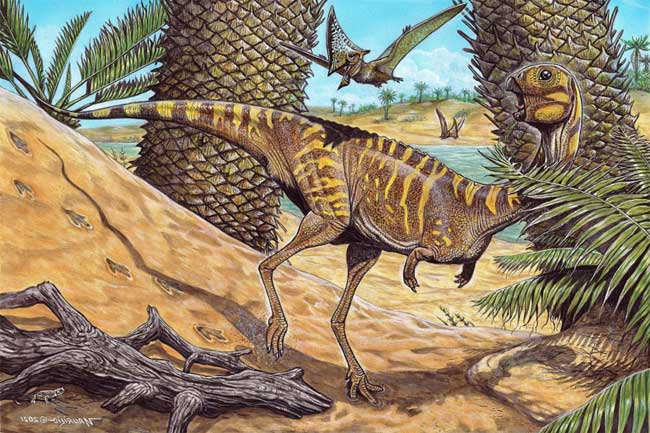Paleontologists discover rare fossils of toothless dinosaurs
Brazilian paleontologists have found a 70-80 million-year-old skeleton of a previously unknown carnivorous dinosaur.
The creature, named Berthasaura leopoldinae, was a small theropod, measuring only about 1 meter long and 80 centimeters tall. Although it is a carnivore, it has no teeth at all, but instead possesses a small and pointed mouth resembling a bird's beak.
"The lack of teeth raises doubts about Berthasaura leopoldinae's diet. However, that does not mean it cannot eat meat. Many birds, such as falcons and buzzards, are carnivorous with It's also possible that the new dinosaurs were omnivores, eating just about anything in a harsh environment," said study lead author Geovane Alves Souza from the Brazilian National Museum in Rio de Janeiro. explain.
The creature's skeleton was found along a rural road in the southern Brazilian state of Parana. In a report in the journal Nature on November 18, the excavating team highlighted the find as "very rare" and one of the most complete Cretaceous dinosaur fossils in Brazil.

Model of the dinosaur Berthasaura leopoldinae.
"The fossils also preserve the skull, jaw, spine, sternum, pelvis, forelimbs and hind limbs," added museum director Alexandre Kellner.
The naming of Berthasaura Leopoldinae for the new dinosaur is in honor of Bertha Lutz, a famous Brazilian scientist and politician who died in 1976. She was a front-runner in the feminist and human rights movement. made an important contribution to women's suffrage in Brazil. Bertha Lutz used to work at the National Museum as a naturalist specializing in poison dart frogs.
- First evidence of dinosaurs 'flying' to eat birds
- Cretaceous fossils reveal new dinosaurs
- Fossil detection of predators before dinosaurs
- Detection of extremely rare dinosaur fossils in the UK
- 114 million-year-old fossils reveal new 'super beasts'
- Discover fossils 2 new hunting dinosaurs
- Discover dinosaurs just as big as wolves
- Found dinosaur fossils about 75 million years
- The discovery of fossil-covered dinosaur-covered fossils in America
- Discover new carnivorous dinosaurs
- Uncover fossils of large dinosaurs never seen
- Discover long-necked dinosaurs in the ice continent
 Discovered an ancient centipede fossil 99 million years old
Discovered an ancient centipede fossil 99 million years old Discovered bat-like dinosaurs in China
Discovered bat-like dinosaurs in China Discovered a 200-year-old bronze cannon of the coast
Discovered a 200-year-old bronze cannon of the coast Discover 305 million-year-old spider fossils
Discover 305 million-year-old spider fossils